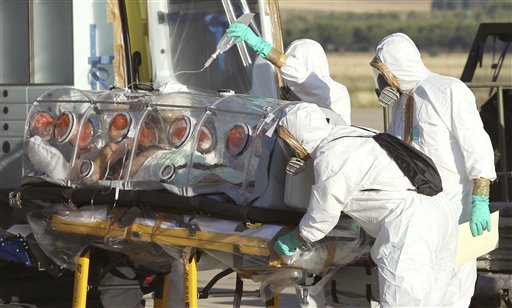
In this Aug. 7, 2014 file photo provided by the Spanish Defense Ministry, aid workers and doctors transfer Miguel Pajares, a Spanish priest who was infected with the Ebola virus while working in Liberia, from a plane to an ambulance as he leaves the Torrejon de Ardoz military airbase, near Madrid, Spain. AP
MADRID — A Spanish missionary priest being treated for Ebola died Tuesday in a Madrid hospital amid a worldwide debate over who should get experimental Ebola treatments.
After holding a teleconference with medical experts around the world, the World Health Organization declared it is ethical to use unproven Ebola drugs and vaccines in the current outbreak in West Africa provided the right conditions are met. Its statement, however, sidestepped the key question of how to decide who should get the limited drugs.
Two more experimental Ebola treatments were reportedly heading Tuesday to Liberia to be used on two infected doctors — the first Africans to receive the untested drug.
The U.N. health agency says 1,013 people have died so far in the Ebola outbreak in West Africa and authorities have recorded 1,848 suspected or confirmed cases. The killer virus, spread by direct contact with bodily fluids like blood, diarrhea and vomit, was detected in Guinea in March and has since spread to Sierra Leone, Liberia and possibly Nigeria.
Two Americans and reportedly the Spanish priest who died had gotten the drug named ZMapp, which has never been tested in humans. But the vast majority of Ebola victims have been Africans, and some have protested that their citizens are not getting access to the novel drugs.
“We can’t afford to be passive while many more die,” said Aisha Dab, a Senegalese-Gambian journalist who was tweeting using the hashtag “GiveUsTheSerum.”
The company that makes ZMapp said Monday that its available supply was “exhausted.”
The Spanish missionary, 75-year-old Miguel Parajes, died in Madrid’s Carlos III Hospital, the hospital and his order said. The hospital would not confirm that he had been treated with the drug, but his order and Spain’s Health Ministry said earlier that he would be. His body will be cremated Wednesday to avoid any further public health risks, the hospital said.
Parajes had worked for the San Juan de Dios hospital order, a Catholic aid group, and had been helping to treat people with Ebola in Liberia when he became ill and was evacuated.
WHO decided it is ethical to use experimental treatments and vaccines in West Africa even though there’s no evidence yet that these experimental drugs can actually help fight Ebola and it is possible they could be harmful or have no effect at all.
The agency said the size of the outbreak — the biggest-ever in history— made the experimental use of drugs ethical.
“It seems some of the usual methods we’re using … are not working as well,” said Dr. Marie-Paule Kieny, an assistant director-general at WHO, during a press conference. “We don’t have enough people to rely on the traditional methods if we want to stop the outbreak as soon as possible.”
WHO said it was OK to use unproven treatments if certain criteria were met, including informed consent, confidentiality and freedom of choice.
The panel said a “more detailed analysis and discussion” are needed to decide who should have access to any experimental treatments, since there is an extremely limited supply of the novel drugs and vaccines. WHO also said the world had “a moral duty” to collect evidence about any untested treatment’s safety and effectiveness in proper scientific trials.
Kieny said it was difficult to judge how the few experimental treatments have been doled out so far.
“I don’t think there could be any fair distribution of something available in such small quantities,” she said.
She added that some companies were speeding up trials of their new Ebola vaccines and it was possible there might be some preliminary safety data by the end of the year.
West African nations are struggling to control both the deadly outbreak and the fear it has engendered. Most airlines flying in and out of the Liberian capital of Monrovia have suspended flights amid the unprecedented health crisis.
The Ivory Coast, which shares borders with Liberia and Guinea, banned direct flights from those countries and said it would increase health inspections at its borders.
On Tuesday, Liberian President Ellen Johnson Sirleaf suspended all travel by executive branch officials for one month. She also ordered those already abroad to return home within a week “or be considered as abandoning their jobs,” according to a statement.
A U.K.-based public relations firm representing Liberia said the experimental Ebola treatment named ZMapp would be arriving within the next 48 hours to treat the two Liberian physicians.
“The two doctors gave their consent, themselves being medical professionals, for the drug to be administered,” the statement said. “The drugmaker has agreed to supply a sufficient amount of this drug only for these two patients.”
RELATED STORIES
DOH: 5 OFWs cleared of Ebola virus
DOH gives tips on how Filipinos can avoid Ebola virus
WHO declares Ebola virus ‘health emergency of international concern’